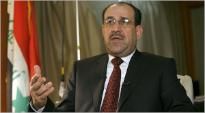Maliki Has 30 Days to Form Govt
Iraq’s president formally nominated Nuri Kamal al-Maliki for a second term as the country’s prime minister on Thursday, giving him 30 days to cobble together a government from competing factions that remain deeply divided and suspicious of his return to power.
President Jalal Talabani first nominated Mr. Maliki when Iraq’s new Parliament met in a stormy session two weeks ago. But he delayed the formal designation required by the country’s constitution until Thursday to give Mr. Maliki the maximum amount of time to negotiate the competing demands of parliamentary blocs that covet leadership posts.
Mr. Talabani, a Kurd who was re-elected two weeks ago, announced the nomination in a televised ceremony at his Peace Palace on the Tigris River. He was joined by leaders of all the major parties except Mr. Maliki’s main rival, Ayad Allawi, a Shiite whose coalition won the support of most of Iraq’s Sunnis.
President Talabani called on Mr. Maliki to form “a new government that we hope will be a government of national partnership and will not exclude anyone.”
It has been a long time coming.
The elections for 325 members of the Council of Representative were held on March 7, but legal challenges and political squabbling delayed first the results and then the convening of Parliament through the summer and fall.
Even if Mr. Maliki meets the 30-day deadline in late December — which is not a certainty, given the chronic disregard for legal deadlines in Iraqi politics — the country will have spent more than nine months under a caretaker government without a functioning legislature. Many of Iraq’s most critical needs — from basic services to investment — have remained unaddressed throughout the impasse.
Mr. Maliki, 60, a Shiite first elected as a compromise prime minister in 2006, appealed for unity. Reading from written remarks, he urged the political leaders with him “to overcome the disputes from the past, to put them behind us and to open a new page of cooperation in building the country.”
He said that the improvement in security was his greatest accomplishment in office, and emphasized the need to support the security forces “in their difficult mission” against an untamed insurgency. He did not mention the United States or its role assisting those forces.
At the same time, Mr. Maliki appeared mindful of growing public frustration over the failure to improve basic services like electricity.
“We want an active and qualified government to provide services to our people that we delayed for a long time,” he said.
Mr. Maliki’s formal nomination begins what is expected to be another period of Byzantine jockeying for control of ministries and other agencies.
Click here to read more.
President Jalal Talabani first nominated Mr. Maliki when Iraq’s new Parliament met in a stormy session two weeks ago. But he delayed the formal designation required by the country’s constitution until Thursday to give Mr. Maliki the maximum amount of time to negotiate the competing demands of parliamentary blocs that covet leadership posts.
Mr. Talabani, a Kurd who was re-elected two weeks ago, announced the nomination in a televised ceremony at his Peace Palace on the Tigris River. He was joined by leaders of all the major parties except Mr. Maliki’s main rival, Ayad Allawi, a Shiite whose coalition won the support of most of Iraq’s Sunnis.
President Talabani called on Mr. Maliki to form “a new government that we hope will be a government of national partnership and will not exclude anyone.”
It has been a long time coming.
The elections for 325 members of the Council of Representative were held on March 7, but legal challenges and political squabbling delayed first the results and then the convening of Parliament through the summer and fall.
Even if Mr. Maliki meets the 30-day deadline in late December — which is not a certainty, given the chronic disregard for legal deadlines in Iraqi politics — the country will have spent more than nine months under a caretaker government without a functioning legislature. Many of Iraq’s most critical needs — from basic services to investment — have remained unaddressed throughout the impasse.
Mr. Maliki, 60, a Shiite first elected as a compromise prime minister in 2006, appealed for unity. Reading from written remarks, he urged the political leaders with him “to overcome the disputes from the past, to put them behind us and to open a new page of cooperation in building the country.”
He said that the improvement in security was his greatest accomplishment in office, and emphasized the need to support the security forces “in their difficult mission” against an untamed insurgency. He did not mention the United States or its role assisting those forces.
At the same time, Mr. Maliki appeared mindful of growing public frustration over the failure to improve basic services like electricity.
“We want an active and qualified government to provide services to our people that we delayed for a long time,” he said.
Mr. Maliki’s formal nomination begins what is expected to be another period of Byzantine jockeying for control of ministries and other agencies.


